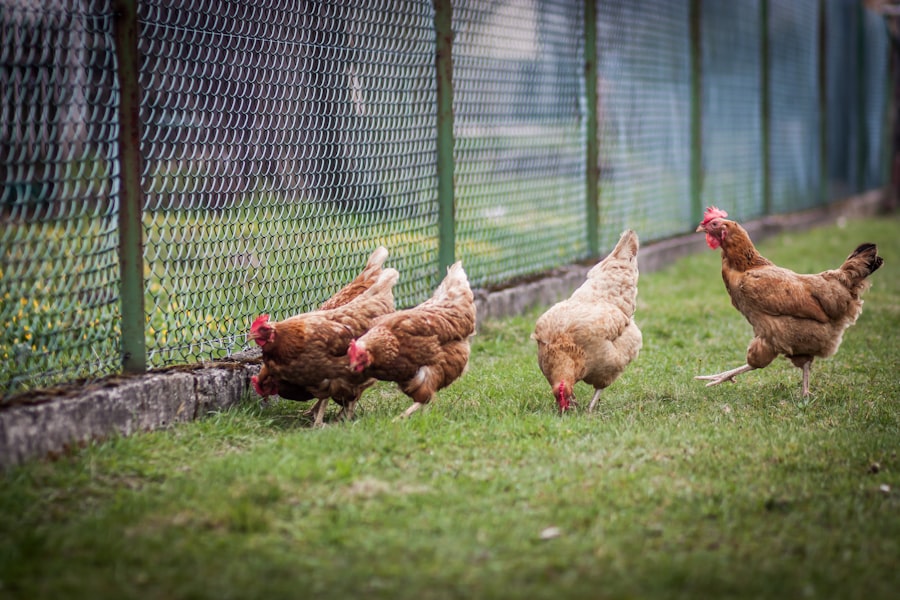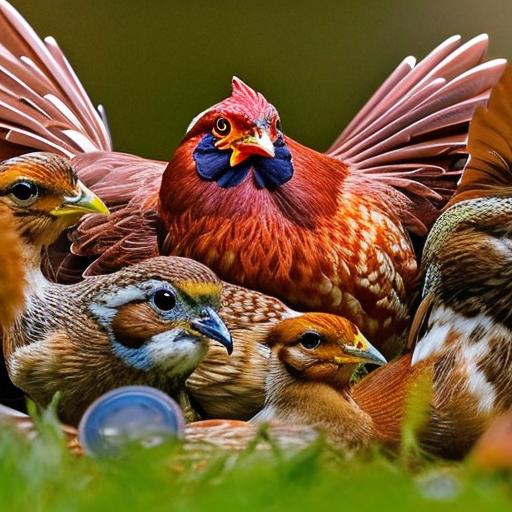Homeowners insurance is a crucial aspect of protecting your property and belongings. However, many people may not realize that certain activities, such as raising chickens, can have an impact on their homeowners insurance coverage. Understanding the relationship between homeowners insurance and raising chickens is essential for homeowners who are considering this hobby. In this article, we will explore the risks associated with raising chickens, the exclusions in homeowners insurance policies for poultry-related incidents, the importance of a chicken coop, and how it can affect homeowners insurance.
Key Takeaways
- Homeowners insurance typically covers damage to property caused by certain risks, but may exclude coverage for certain activities or animals.
- Raising chickens can pose risks to property and may not be covered by homeowners insurance.
- A chicken coop is a structure designed to house chickens and protect them from predators.
- A well-built chicken coop can reduce the risks associated with raising chickens and may help comply with homeowners insurance requirements.
- Alternative options for keeping chickens, such as community gardens or urban farms, may offer benefits without the risks associated with homeowners insurance.
Understanding Homeowners Insurance
Homeowners insurance is a type of property insurance that provides financial protection to homeowners in the event of damage or loss to their property or belongings. It typically covers damage caused by fire, theft, vandalism, and certain natural disasters. Additionally, homeowners insurance provides liability coverage in case someone is injured on your property and you are found legally responsible.
Having homeowners insurance is important because it offers financial protection and peace of mind. It can help cover the cost of repairing or rebuilding your home if it is damaged or destroyed by a covered event. It can also provide compensation for stolen or damaged belongings. Furthermore, homeowners insurance can protect you from liability claims if someone is injured on your property and decides to sue you.
The Risks of Raising Chickens
Raising chickens can be a rewarding and enjoyable hobby, but it also comes with its own set of risks. One potential risk is property damage. Chickens can scratch and peck at the ground, which may cause damage to lawns, gardens, and landscaping. They may also damage fences or other structures in your yard.
Another risk associated with raising chickens is liability issues. Chickens can carry diseases such as salmonella, which can be transmitted to humans through contact with their droppings or feathers. If someone were to become ill as a result of exposure to your chickens or their waste, you could be held liable for their medical expenses and other damages.
It is important to be aware of these risks before deciding to raise chickens. Understanding the potential consequences can help you make an informed decision and take the necessary precautions to mitigate these risks.
Homeowners Insurance and Poultry Exclusions
Many homeowners insurance policies have exclusions for poultry-related incidents. This means that if your chickens cause damage to your property or someone else’s property, or if someone is injured as a result of your chickens, your homeowners insurance may not cover the costs associated with these incidents.
These exclusions are in place because insurance companies consider raising chickens to be a higher risk activity. The potential for property damage and liability issues is greater when chickens are involved. Therefore, it is important to review your homeowners insurance policy carefully to understand what is covered and what is excluded.
What is a Chicken Coop?
A chicken coop is a structure specifically designed to house and protect chickens. It provides shelter from the elements, security from predators, and a safe space for the chickens to roost, lay eggs, and move around. A chicken coop typically consists of an enclosed area where the chickens can roam freely during the day, as well as a separate area for them to sleep and lay eggs.
The purpose of a chicken coop is twofold: to ensure the safety and well-being of the chickens and to protect the homeowner from liability issues. By providing a secure and contained space for the chickens, a chicken coop helps prevent them from causing damage to property or wandering into areas where they may pose a risk to themselves or others.
The Importance of a Chicken Coop

A chicken coop is essential for raising chickens safely and responsibly. It provides protection from predators such as foxes, raccoons, and birds of prey that may try to harm or kill the chickens. It also helps prevent the spread of diseases by keeping the chickens contained in a clean and controlled environment.
Having a chicken coop is not only beneficial for the chickens but also for the homeowner. It helps minimize the risk of property damage by keeping the chickens confined to a designated area. It also reduces the likelihood of liability issues by preventing the chickens from coming into contact with visitors or neighboring properties.
How a Chicken Coop Affects Homeowners Insurance
The presence of a chicken coop can affect a homeowner’s insurance policy. Some insurance companies may require homeowners to have a chicken coop in order to provide coverage for poultry-related incidents. Others may have specific requirements regarding the size, construction, and location of the chicken coop.
It is important to review your homeowners insurance policy and speak with your insurance provider to understand how a chicken coop may impact your coverage. Failure to comply with your insurance policy’s requirements regarding chicken coops could result in a denial of coverage for any poultry-related incidents that occur on your property.
What to Look for in a Chicken Coop to Comply with Homeowners Insurance
If you are considering raising chickens and want to ensure that your homeowners insurance will cover any poultry-related incidents, there are several things to look for when choosing a chicken coop:
1. Size: Make sure the chicken coop is large enough to comfortably accommodate the number of chickens you plan to raise. It should provide enough space for them to move around, roost, and lay eggs.
2. Construction: The chicken coop should be well-built and sturdy. It should be able to withstand harsh weather conditions and protect the chickens from predators.
3. Security: The chicken coop should have secure fencing or walls to prevent the chickens from escaping and wandering onto neighboring properties. It should also have locks or latches on all doors and windows to keep predators out.
4. Ventilation: Proper ventilation is important for maintaining good air quality inside the chicken coop. Look for a coop that has windows or vents that can be opened and closed as needed.
5. Cleanliness: A clean and well-maintained chicken coop is essential for the health and well-being of the chickens. Look for a coop that is easy to clean and has features such as removable trays or floors for easy waste removal.
By choosing a chicken coop that meets these criteria, you can ensure that it complies with your homeowners insurance policy’s requirements and provides a safe and secure environment for your chickens.
Alternative Options for Keeping Chickens
If the risks associated with raising chickens and the impact on homeowners insurance are a concern, there are alternative options for keeping chickens that may be a better fit for some homeowners. Community gardens or urban farms often have designated areas for raising chickens, where the risks and responsibilities are shared among multiple individuals.
Joining a community garden or urban farm allows you to enjoy the benefits of raising chickens without the same level of personal liability. It also provides an opportunity to connect with other like-minded individuals who share your interest in sustainable living and urban agriculture.
Weighing the Pros and Cons of Keeping Chickens and Homeowners Insurance
Raising chickens can be a rewarding and fulfilling hobby, but it is important to understand the potential risks and how they may impact your homeowners insurance coverage. By being aware of the risks associated with raising chickens, understanding the exclusions in your homeowners insurance policy, and taking the necessary precautions such as having a secure chicken coop, you can enjoy the benefits of raising chickens while minimizing potential liabilities.
Before making a decision about raising chickens, it is important to weigh the pros and cons carefully. Consider factors such as the time and effort required to care for chickens, the potential risks and liabilities involved, and how it may impact your homeowners insurance coverage. By making an informed decision, you can ensure that raising chickens is a positive experience for both you and your neighbors.
We encourage readers to share their own experiences with raising chickens or ask any questions they may have about homeowners insurance and raising chickens. Your feedback and insights are valuable and can help others make informed decisions about this topic.
If you’re considering getting chickens for your backyard, it’s important to understand the potential implications on your homeowners insurance. Many insurance policies have restrictions on certain types of animals, including poultry. To learn more about how homeowners insurance can impact your ability to keep chickens, check out this informative article on Poultry Wizard: Can Homeowners Insurance Keep You from Getting Chickens?
FAQs
What is homeowners insurance?
Homeowners insurance is a type of insurance policy that provides financial protection to homeowners in the event of damage or loss to their property or personal belongings.
Can homeowners insurance prevent me from getting chickens?
Yes, some homeowners insurance policies may have restrictions or exclusions on owning certain types of animals, including chickens.
Why do some homeowners insurance policies restrict owning chickens?
Some insurance companies view chickens as a liability risk due to the potential for property damage, personal injury, and health hazards associated with owning them.
What should I do if I want to keep chickens but my homeowners insurance policy restricts it?
You may need to shop around for a different insurance policy that allows for owning chickens or consider obtaining a separate liability insurance policy specifically for your chickens.
What are some other factors to consider before getting chickens?
Before getting chickens, it is important to research local zoning laws and regulations, as well as any neighborhood or homeowner association rules that may prohibit or restrict owning chickens. Additionally, it is important to consider the time, effort, and resources required to properly care for and maintain a chicken coop and flock.
Meet Walter, the feathered-friend fanatic of Florida! Nestled in the sunshine state, Walter struts through life with his feathered companions, clucking his way to happiness. With a coop that’s fancier than a five-star hotel, he’s the Don Juan of the chicken world. When he’s not teaching his hens to do the cha-cha, you’ll find him in a heated debate with his prized rooster, Sir Clucks-a-Lot. Walter’s poultry passion is no yolk; he’s the sunny-side-up guy you never knew you needed in your flock of friends!







